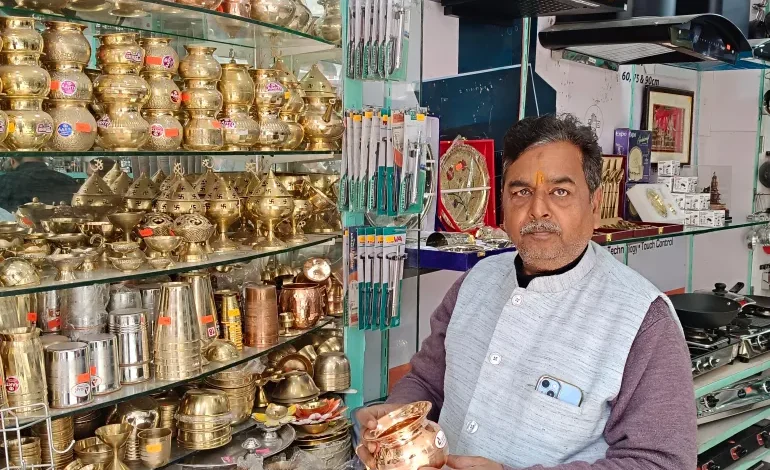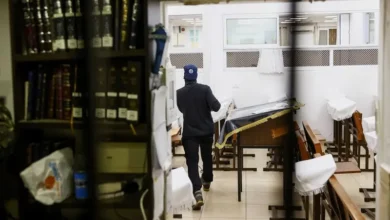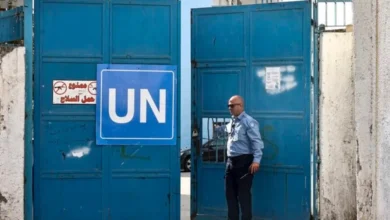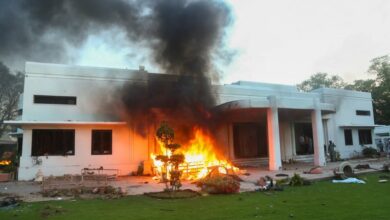‘Better future’: India’s Ayodhya sees business boom with Ram temple launch

A 13-kilometre stretch around the controversial Ram temple in the northern Indian city of Ayodhya is lit up with sparkling lights, the walls in the area covered in murals as the city prepares for the January 22 inauguration ceremony by Prime Minister Narendra Modi.
But Rajesh Majhi has no time to enjoy the beauty of the city as he is working overtime to print banners to be used for roadside advertisements for the consecration ceremony. He is also behind on huge orders of wooden carved miniature replicas of the Ram temple, which is currently under construction.
The 38-year-old says his business has increased nearly 30 percent in the past six months. “I have been in the business for the past 12 years, but have never witnessed such a huge demand for banners. There is a surge in the visits of VIPs and religious activities in the city in the past few months,” he told Al Jazeera.
His monthly orders for banners have doubled to 60,000 now from a year ago, and he’s opened a manufacturing unit to make replicas of the Ram temple, a new business line for him, he said.
“We are making 4,000-5,000 pieces every month but the demand is more than the supply. Traders are ready to pay any price and buy them because of that gap between demand and supply,” he said.
Kamal Kaushal, 62, who sells utensils in the city, around seven kilometres from the temple, is also happy with the rapid growth of his business.
“I have been running my shop since 1978 but have never come across such a massive demand for utensils used in religious activities. Earlier, it was even difficult to sell one lakh rupees [$1,206] worth of utensils in a year. But now I have done three lakh rupees [$3,618] sales in the past year. We hope to witness more hikes once the Ram temple opens up for the public.”
The duo are not alone as several thousand traders in the region have been doing brisk business ever since construction for the temple started in 2020, months after the Supreme Court of India handed control of the disputed religious site of 2.77 acres to Hindus. The burst in economic activity is expected to solidify support for Modi among the local traders in the upcoming national elections.
Infrastructure boost
With the temple construction under way, the district with a population of around 2.5 million has seen a series of activities by the central and the state governments, both led by the right-wing Bharatiya Janata Party (BJP), which are leaving no stone unturned to give a grand look to the city and turn it into a big spiritual hub in the country ahead of national elections later this year.
Around 178 projects worth around 305 billion rupees ($3.6bn) have been initiated, including a railway station modelled on the Ram temple, an international airport, a modern township – the area for which has been demarcated – widened roads and decorative street lights.
“We have suffered a lot in the past three decades since the movement for building the Ram temple intensified in the 1980s as there were frequent strikes and shutdowns called by different outfits [over] constructing the temple,” said Sushil Jaiswal, convener of a local business forum that includes 15,000 traders in Ayodhya district.
“Even after the Supreme Court verdict, the development work that began involving road widening and building of sewage system has affected our business for the past three years,” he added. “But now we are hoping for a better future as… it is becoming the business hub of the state due to the temple.”
The government has also granted a Geographical Indication (GI) tag to the besan laddus or gram flour sweets that are offered as prasad to the god.
There are around 500 shops located in just one-kilometre area of the temple selling the gram flour sweet to the devotees.
Shakti Jaiswal, 38, who runs a sweet shop around 400 metres away from the Ram temple, is hopeful that the tag would help him enhance his business.
“The counter sales will definitely improve with the influx of tourists that would see a surge post the consecration ceremony. The GI tag will help us to take our business online and reach new markets and create more income opportunities,” he said.
Vishal Singh, vice chairman of Ayodhya Development Authority (ADA), involved in the development of infrastructure told Al Jazeera that the government aims to create a massive livelihood with the temple.
“The growth in the hospitality sector is witnessing reverse migration as people working in other cities or states are returning here … and 50 new hotels have been sanctioned,” he said.










